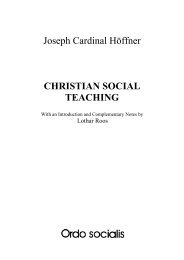Prof. Franz Josef Stegmann Bethlehem Social ... - Ordo Socialis
Prof. Franz Josef Stegmann Bethlehem Social ... - Ordo Socialis
Prof. Franz Josef Stegmann Bethlehem Social ... - Ordo Socialis
Create successful ePaper yourself
Turn your PDF publications into a flip-book with our unique Google optimized e-Paper software.
<strong>Stegmann</strong><br />
to ensure the best possible provision for all; the objective of the economy is "not to meet the<br />
demand to a maximal extent but in an optimal way". Guidelines for economic activities<br />
therefore cannot be obtained only from the economic sphere itself; these guidelines must also<br />
be determined by ethical and human values - by the dignity of the human person.<br />
<strong>Social</strong> Market Economy in neoliberal thought is therefore called "social" without full<br />
justification and only "on credit", even though it constitutes a huge progress compared to<br />
palaeoliberal capitalism. This <strong>Social</strong> Market Economy is completely identical with the<br />
economic ideas of the outlined neoliberalism and, to my mind, some European neoliberals are<br />
deliberately using the expression "free market economy - in the same sense as <strong>Social</strong> Market<br />
Economy. It would therefore be better and more honest if they only spoke of Neoliberal<br />
instead of <strong>Social</strong> Market Economy even though it marks - I emphasise once again - a huge<br />
progress in comparison with Manchester Capitalism.<br />
4. FROM A NEOLIBERAL TO A (GENUINE) SOCIAL MARKET ECONOMY<br />
4.1 Market economy and social dimension -equal in weight<br />
<strong>Social</strong> Market Economy in neoliberal terms implies free and well-working competition that is<br />
safeguarded by the state, as well as social targets for the economy. Its guiding principle was<br />
and is: good economic policy is good social policy. What is crucial for neoliberals is that the<br />
economy should achieve the maximum output, and the economic process should be allowed<br />
free play. Afterwards - if necessary - social corrections ought to be carried out.<br />
Against this view I put forward the following objection. <strong>Social</strong> Market Economv in the outlined<br />
neoliberal understanding is not yet a <strong>Social</strong> Market Economy in the real and full sense<br />
of the term. We should not overlook this, especially in view of economic practices after the<br />
collapse of the centrally controlled economies in former Eastern bloc states, but also<br />
elsewhere. I mentioned what I call "capitalistic neoliberalism", up to now existing in many<br />
countries, not only in Latin America. Some of these practices, maybe many of them, have<br />
only pretensions to be considered as <strong>Social</strong> Market Economy. But <strong>Social</strong> Market Economy in<br />
true neoliberal thought is also called "social" without full justification. It is not enough to<br />
make possible and to safeguard the process of the free market and economic competition, and<br />
afterwards - perhaps - to correct socially detrimental results. It is not good enough to pull the<br />
child out of the river, after it has fallen in. It is just as crucial that from the very beginning the<br />
social dimension is recognised as essential and equal in weight to all economic activities. To<br />
use the metaphor again, the child must be protected from falling into the water. <strong>Social</strong> Market<br />
Economy in the real and full sense, which is not a simple neoliberal one, does not only<br />
safeguard the "play of the cumpeting market forces" and later on - if necessary - carry out<br />
social corrections. From the very outset, state and politics have to provide those<br />
presuppositions and conditions which are needed - as the repeatedly mentioned Oswald von<br />
Nell-Breuning demanded - for "a human economic process and for its positive social<br />
results" 72 (für einen sozial befriedigenden Vollzug und ein sozial gerechtes Ergebnis der<br />
Wirtschaft).<br />
4.2 Humane economic process - positive social results<br />
The "human production process" includes the humanisation of working conditions so that<br />
employees are not already crushed under the wheels of the production process, and it also<br />
72 Oswald von Nell‐Breuning, Wie "sozial" ist die ''Soziale Marktwirtschaft"? in: Den Kapitalismus umbiegen.<br />
Schriften zu Kirche, Wirtschaft und Gesellschaft, ed. by Friedhelm Hengsbach, Düsseldorf, 1990, 222‐238, 236.<br />
30















